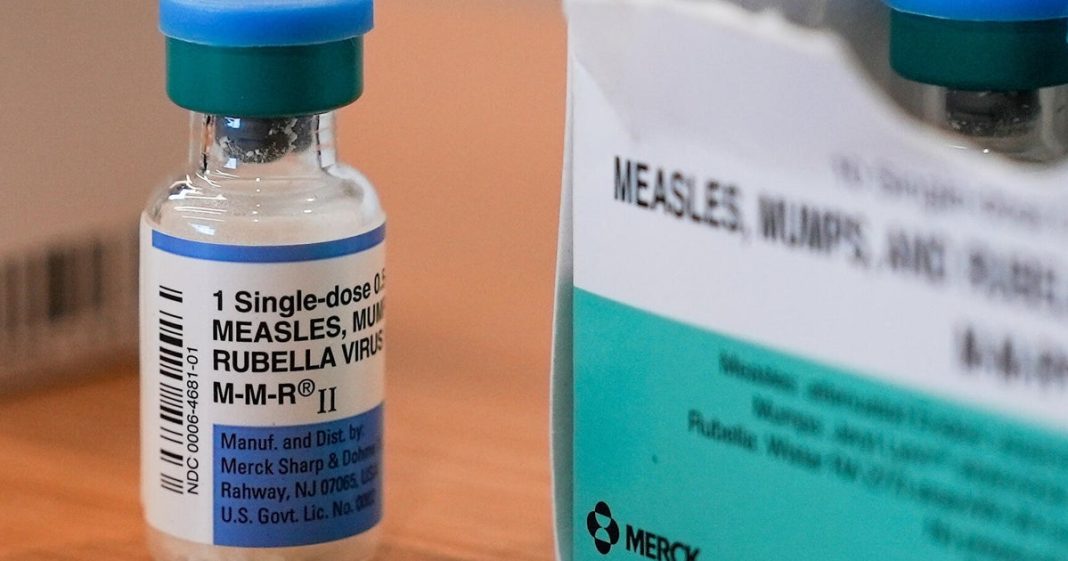At least 3% of measles cases confirmed so far this year have been in people who received two doses of the measles vaccine, meaning they were fully vaccinated, the Centers for Disease Control and Prevention says.
About three dozen of the nearly 1,200 measles infections in 2025 have been in people with two vaccine doses, the agency said Friday in its weekly update on cases. An additional 2% of cases were in people who received at least one dose of the measles vaccine.
Many of the cases were in Texas, which on Tuesday counted a 21st confirmed measles case in someone with at least two doses of the vaccine.
Lara Anton, a spokesperson for the Texas Department of State Health Services, said Monday that their first 20 cases were in children 8 years old or younger. Anton did not immediately respond to a request for more information about the additional case, which was reported on Tuesday.
A CDC spokesperson said in an email their data reflects vaccination status at the time someone was exposed to the virus. This means none of the 36 vaccinated cases they confirmed Friday received their second dose as a result of post-exposure prophylaxis. Post-exposure prophylaxis is offering someone a drug or vaccine after they are exposed to a germ, to reduce the chance they will be infected or develop severe disease.
The CDC says people exposed to measles can get vaccinated within 72 hours of when they were first exposed, if they are not fully immunized. “If administered within 72 hours of initial measles exposure, MMR vaccine might provide some protection against infection or modify the clinical course of disease,” the agency’s recommendations say.
The CDC spokesperson said, “The MMR vaccine is the best way to protect against measles and its complications.”
“Disease symptoms are generally milder in vaccinated people,” the spokesperson said. “People who are vaccinated are also less likely to spread the disease to other people.”
“The decision to vaccinate is a personal one,” the spokesperson said. “People should consult with their healthcare provider to understand their options to get a vaccine and should be informed about the potential risks and benefits associated with vaccines.”
Texas has seen a deadly outbreak of the highly contagious virus this year. While cases there have recently slowed, CDC officials have said that authorities have been tracking more outbreaks in other communities across the U.S. linked to travel outside and inside the country.
“Additional cases have been seeded from the outbreak in Texas, as well as related outbreaks in Mexico and Canada. Additionally, measles importation from international travel continues, especially as the busy summer of travel season ramps up,” Brian Wakeman, deputy lead of the CDC’s measles laboratory task force, said Monday.
Wakeman, who spoke on a nationwide call for testing laboratories, said the U.S. is now on pace to top the 1,274 cases of measles seen in 2019. That was the most cases the U.S. has seen in a single year since endemic spread of the virus was declared “eliminated” at the end of the 20th century.
“We’re also on pace to be the greatest number of measles cases since the early 90s,” Wakeman said.
None of the confirmed measles cases that led to hospitalizations this year had documented evidence of receiving two doses of vaccine, the CDC spokesperson said. More than 8 in 10 of the cases have been in people 20 years old or older.
Six cases of measles in people who received at least two doses of the vaccine were in Colorado, that state’s health department says.
“None of the six cases with 2+ doses were seniors or required hospitalization,” Hope Shuler, a spokesperson for the Colorado Department of Public Health and Environment, said in an email.
Health authorities and experts have called for some seniors to check if they need a measles booster, especially if they are planning to travel, because of the kind of measles vaccines that were used before 1968.
“That group is unlikely to have robust immunity from infection, because at that point in time, they were using less effective vaccines,” said Dr. Celine Gounder, CBS News medical contributor and editor-at-large for public health at KFF Health News.
Colorado says many of its vaccinated cases have been in residents who were exposed during travel to other parts of the world facing large outbreaks like Canada and Europe.
The state previously said it had linked multiple cases to an infectious traveler who exposed others at Denver International Airport and on a Turkish Airlines flight.
The CDC has issued new guidance for summer camps to prepare for the threat of measles spread this year, including urging camp operators to check for documentation of immunity among staff and children.
Measles vaccines are 97% effective at preventing measles after two doses and 93% after one dose, the CDC says.




